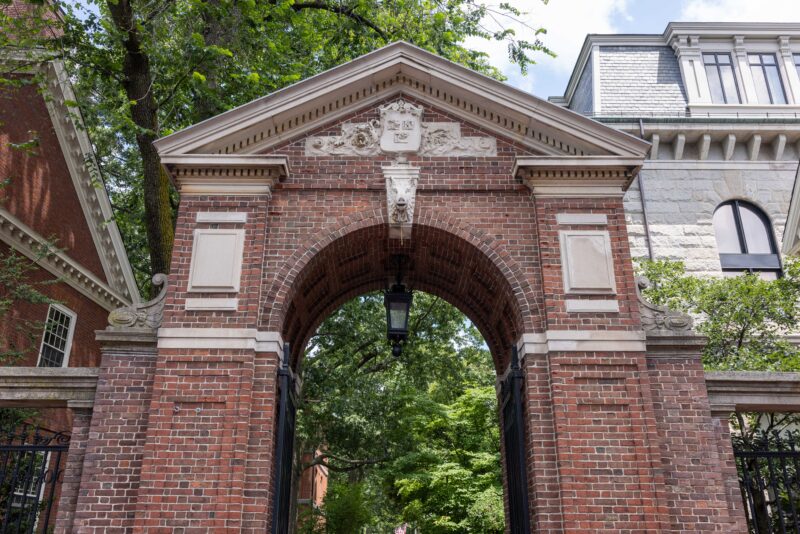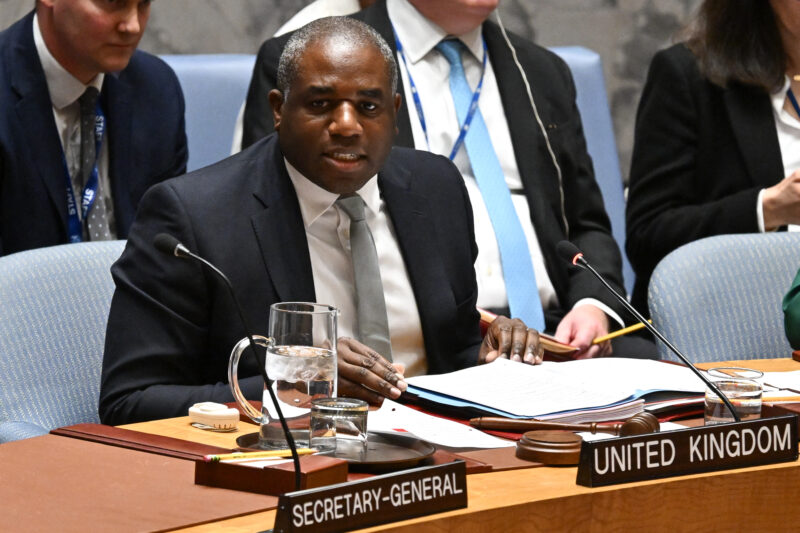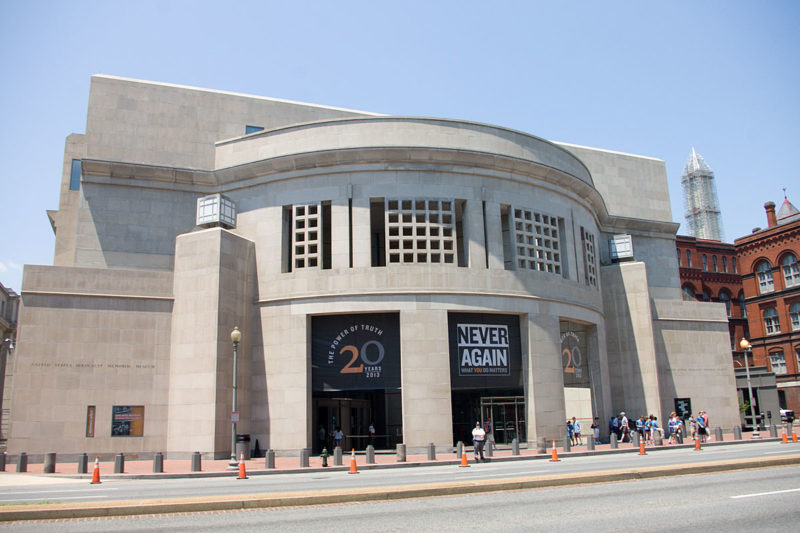Plus, Israel prepares for Edan Alexander's release

Joe Raedle/Getty Images
President Donald Trump gestures as he departs Air Force One at Miami International Airport on February 19, 2025 in Miami, Florida.
Good Monday morning.
In today’s Daily Kickoff, we look at the state of relations between Washington and Jerusalem ahead of President Donald Trump’s trip to Saudi Arabia, Qatar and the United Arab Emirates this week, and report on how Capitol Hill is reacting to Qatar’s plans to gift a $400 million luxury jet to Trump. We also do a deep dive into the ‘123 Agreement’ being pushed by GOP senators wary of nuclear negotiations with Iran, and report on the University of Washington’s handling of recent anti-Israel campus protests. Also in today’s Daily Kickoff: Iris Haim, Natalie Portman and Nafea Bshara.
What We’re Watching
- Middle East envoy Steve Witkoff is in Israel today following the announcement that Hamas will release Israeli American hostage Edan Alexander today. Adam Boehler, the administration’s hostage affairs envoy, arrived in Israel earlier today along with Alexander’s mother, Yael. More below.
- President Donald Trump is departing later today for his three-country visit to the Middle East. More below.
- An Israeli delegation will reportedly travel to Cairo today to renew negotiations with Hamas.
- Israeli President Isaac Herzog is in Germany today, where he is marking 60 years of German-Israeli relations.
- This afternoon in Tel Aviv, hostage families will march from Hostage Square to the U.S. Embassy Branch Office to call for a “comprehensive” agreement to free the remaining 59 hostages.
What You Should Know
A QUICK WORD WITH Melissa Weiss
“Donald, Bring Them Home” reads a sign in the window of a clothing boutique on Tel Aviv’s busy Dizengoff Street. It’s been in the store window since January, when a temporary ceasefire freed dozens of Israeli hostages, including two Americans, who had been held in captivity in Gaza for over a year. It’s a smaller sign than the billboard that read “Thank you, Mr. President” and for weeks was visible to the thousands of motorists driving on the busy thoroughfare next to the beach.
Returned hostages and hostage families have appealed to the Trump administration for assistance in securing their loved ones’ releases, expressing sentiments conspicuously absent in meetings between former hostages and Israeli government officials, including Prime Minister Benjamin Netanyahu. It’s a situation that underscores how the American efforts to secure the release of the remaining hostages have at times been done not only without Israeli buy-in, but with Israel finding out only after the negotiations concluded.
Such was the case yesterday, when Trump announced that Edan Alexander, the last living American hostage in Gaza, would be released.
The negotiations over the release of Alexander underscore the Trump administration’s “America First” approach to the region that has sidelined Israeli priorities on a range of issues, from the Houthis to Iran to the war in Gaza. It’s a splash of cold water in the face of a nation that largely celebrated Trump’s election six months ago.
The announcement of Alexander’s expected release came after a firehose of news in the days leading up to Trump’s visit to the Middle East, which begins tomorrow. First, the move toward allowing Saudi Arabia to have a civilian nuclear program. Then, the news, confirmed on Sunday by Trump, that Qatar is gifting the president a luxury plane to add to the Air Force One fleet, amid yearslong Boeing manufacturing delays. (More below.)
The Qatari gift alarmed Washington Democrats, with Rep. Ritchie Torres (D-NY) writing to Trump administration officials to express “alarm,” saying Qatar has a “deeply troubling history of financing a barbaric terrorist organization that has the blood of Americans on its hands. In the cruelest irony, Air Force One will have something in common with Hamas: paid for by Qatar.”
Only hours after the news of the gifted jet broke, Trump announced that the U.S., along with Egyptian and Qatari mediators, had reached an agreement to secure Alexander’s release, which he referred to as “the first of those final steps necessary to end this brutal conflict.” Israel was not mentioned a single time in the announcement.
Netanyahu himself conceded that the Americans had reached the deal absent Israeli involvement. “The U.S. has informed Israel of Hamas’s intention to release soldier Edan Alexander as a gesture to the Americans, without conditions or anything in exchange,” Netanyahu said on Sunday evening.
The news stunned observers and offered a measure of renewed hope to the families of remaining hostages, including the four Americans whose bodies remain in Gaza, but opened a deluge of questions about the diplomatic dance that led to an agreement over Alexander’s release.
The timing of the announcement – shortly after news of the gifted Qatari jet broke — raised questions about the potentially transactional nature of the discussions, and deepened concerns that the Trump administration could reach agreements that run counter to Israeli security priorities while the president travels the region (a trip that does not include a stop in Israel, despite Netanyahu’s two visits to the White House since Trump returned to office).
As Trump travels to Saudi Arabia, Qatar and the United Arab Emirates this week, the world will be watching closely. But perhaps nobody will be watching as closely — from more than 1,000 miles away — as Netanyahu.
FIRM FRIENDS?
Trump, Netanyahu administrations downplay rift despite disagreements on Iran, Saudi Arabia

The headlines in the Hebrew media, on the eve of President Donald Trump’s visit to the Middle East this week, played up what some see as an emerging rift between Israel and the U.S. “Concerns in Israel: The deals will hurt the qualitative [military] edge,” read one. The Trump administration has already made a truce with the Houthis and cut a deal with Hamas to release Israeli American hostage Edan Alexander — without Israel — and the concern in Jerusalem is that more surprises — good and bad — may be on the way. Yet insiders in both the Trump administration and the Netanyahu government speaking to Jewish Insider’s Lahav Harkov in recent days on condition of anonymity to discuss sensitive matters took a more sanguine view of the delicate diplomacy, saying that there is no rift, even if there are disagreements.
Calm but critical: Sources in Jerusalem pointed to Prime Minister Benjamin Netanyahu’s two visits to the White House in Trump’s first 100 days in office, as well as Israeli Strategic Affairs Minister Ron Dermer’s meeting with the president last week. A Trump administration source said the relationship remains positive and close, but also criticized Israel for not adapting to the president’s transactional approach to foreign policy. Gulf states are likely to announce major investments in the U.S. during Trump’s visit, while Israel has largely been asking the administration for help. Jerusalem could be putting a greater emphasis on jobs created by U.S.-Israel cooperation in the defense and technological sectors when they speak with Trump, the source suggested.
Signs of stress: The apparent divisions are especially notable in the context of the Iran talks — Israel largely opposes diplomacy with the regime and favors a military option to address Iran’s nuclear program, on which the Trump administration has not yet been willing to cooperate, Jewish Insider’s Marc Rod reports.






















































































